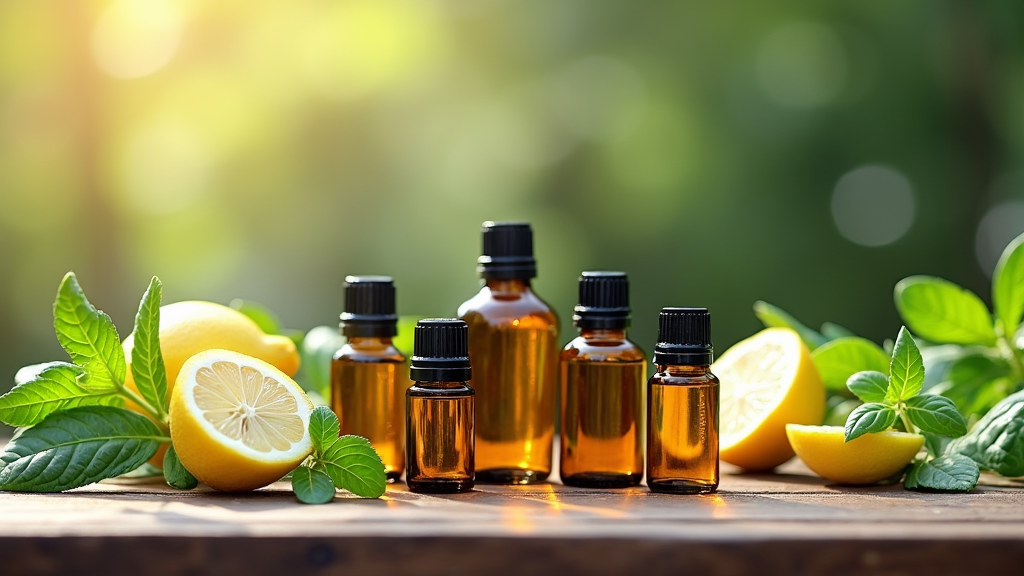Summertime often means soaking up the sunshine, but along with outdoor fun comes a flurry of bugs eager to join the activities. Whether you’re firing up the grill in your backyard or setting up a tent in the woods, flies, mosquitoes, and gnats can turn a great day into an itchy memory. Over the years, I’ve found that essential oils work wonders for helping to keep those bugs away—no need for heavy-duty chemical sprays. Here’s a super detailed guide on the top essential oils for summertime bug protection and how to put them to use.

Why Use Essential Oils for Bug Repellent?
Essential oils have a long history of helping with all sorts of daily hassles, and bug repellent is an area in which they really come through. Many synthetic sprays rely on strong chemicals like DEET. While those products are powerful, they might not be suitable for everyone. Essential oils provide a plant-packed option, and, personally, I appreciate that they smell great while still helping keep bugs away.
For those sensitive to chemical sprays—or those hoping to avoid spraying chemicals around kids or pets—essential oils deliver a natural way to make outdoor time more comfortable. Certain oils, such as citronella and lemongrass, mask the scents that draw bugs in. Others, like peppermint and eucalyptus, are packed with compounds that many bugs can’t stand to be near.
Popular Essential Oils That Repel Bugs
Not every essential oil is a bug-busting hero. Here are my top choices for getting through the summer without constantly swatting at pests:
- Citronella: Hands-down the most well-known natural mosquito repellent. It’s a staple in outdoor candles made to keep bugs at bay.
- Lemongrass: Delivers a similar effect with a fresh, lemony scent. Perfect for mosquitoes and flies.
- Lavender: Incredibly pleasant aroma, gentle on the skin, and helps keep mosquitoes plus a few types of moths from coming around.
- Peppermint: Its bold scent could deter ants, mosquitoes, and even some spiders.
- Eucalyptus: Refreshes your space while helping shoo away mosquitoes.
- Tea Tree: Known for a sharp aroma that can send mosquitoes and flies packing.
- Cedarwood: Helpful for resisting ticks, moths, and fleas, with a satisfyingly earthy fragrance.
- Geranium: With a rosy scent, this oil surprises many by repelling ticks and mosquitoes.
I like keeping a mix of these oils within reach. Custom-blending based on what pests are causing trouble lets you tailor your defenses, making outdoor life more relaxing.
How to Use Essential Oils for Bug Protection
Essential oils offer plenty of flexibility in how you use them. Whether you prefer sprays, diffusers, or applying them to clothing, there’s a technique that fits your routine. Here’s how to get started:
DIY Bug Repellent Spray
- Mix 20-30 drops total of your chosen essential oils in a 4 oz spray bottle.
- Add 2 tablespoons witch hazel or vodka for preservation and to help the oils blend in.
- Fill up the rest with distilled water. Give it a solid shake before each use.
- Spray clothing or gear (avoid direct skin contact for your first test), and reapply every couple hours when outside.
This homemade spray fits perfectly in a backpack or picnic basket. Remember to patch test on a small area of your skin or clothing to check for sensitivity, and avoid areas like your face or open wounds.
Diffusers and Candles
When hanging out on patios or around the campfire, a good diffuser or quality candle can be a game changer. I just add a few drops of citronella, lemongrass, or lavender oil into a portable diffuser and let it spread the aroma. Citronella candles provide a nice layer by fragrance and function. Make sure the candle is made with real essential oils for the most benefit.
Roll-Ons and Lotions
Roll-ons or homemade lotions come in handy for quick coverage on exposed skin, like wrists, ankles, or the back of the neck. Take a few drops of essential oil, blend with a carrier oil (think coconut, jojoba, or sweet almond), and apply very lightly. Always dilute before putting essential oils on your skin—they’re super concentrated and could cause irritation if used alone.
Here is a link where you can find all these essential oils:
https://referral.doterra.me/4740777
What Bugs Do These Essential Oils Work Against?
The best results come from knowing which bug is bugging you. Here’s a look at which oils help with specific pests:
- Mosquitoes: Citronella, lemongrass, lavender, geranium, and eucalyptus are the top players here.
- Ticks: Geranium, cedarwood, and tea tree oil are useful to keep ticks off your clothes and skin during hikes.
- Flies: Lemongrass, peppermint, and lavender can make your food (and you) less interesting to flies.
- Gnats: Eucalyptus and cedarwood can dial down gnat activity around water or wooded zones.
- Ants: Peppermint essential oil is another great trick for steering ants away—no need for chalk lines or powder.
Combining two or three oils tends to make them more effective together. Just remember, less is more—overdoing the scents can overwhelm people as much as insects.
Safety Tips and Best Practices
Even totally natural products need a thoughtful approach. I always dilute essential oils with a carrier oil when applying to skin, and never use them directly on babies, pets, or anyone with scent sensitivities.
- Mix with a carrier oil before touching your skin.
- Keep oils away from your eyes, mouth, and any cuts or scrapes.
- Do a patch test on a small skin area (inside the elbow is a good spot) before wider use.
- Double-check which oils are pet-friendly before spraying or diffusing them inside.
- Store oils safely, out of kids’ reach and away from direct sunlight to keep them potent.
If you’re pregnant, breastfeeding, have allergies, or other health factors, ask a medical pro for advice. Some oils, including eucalyptus and tea tree, aren’t good choices for young children.
Common Questions About Essential Oils for Bug Protection
Curious about switching to essential oil bug sprays? Here are a few of the top questions I hear:
Question: How often do I need to reapply essential oil sprays?
Answer: These sprays generally protect for 1-2 hours outdoors. Reapply more often if you’re sweating, swimming, or the bugs are especially active.
Question: Can I use essential oils around young kids or pets?
Answer: Be cautious. Oils like eucalyptus, tea tree, or peppermint can be too strong for babies, young kids, and some pets. Lavender and cedarwood are gentler, but always check with a trusted health professional first.
Question: What happens if I get essential oils on my skin and it stings or itches?
Answer: Rinse the area with cool water and mild soap. You can also apply a plain carrier oil like coconut or olive oil to help reduce the strength. Persistent irritation means it’s time to contact a doctor.
Question: Are essential oils as effective as DEET-based bug sprays?
Answer: For light to moderate everyday bug control, essential oils help reduce bites but don’t usually offer the same hours-long protection as DEET or permethrin products. In high-risk bug areas, use physical barriers like clothing and tents along with natural methods.
Real-World Ways Essential Oils Help Outdoors
In my own experience, essential oil sprays make a noticeable difference on hikes, summer picnics, and while gardening. They don’t create an unbreakable bubble, but they add a welcome layer of defense. A friend of mine puts together a blend of citronella, peppermint, and eucalyptus—after diluting—for her dog’s outdoor bedding, which helps keep fleas and mosquitoes away and smells loads better than any chemical option.
- Patios and decks: Fire up a diffuser with lemongrass or eucalyptus oil for a bug-beating mist.
- Camping tents: Lightly spray entry flaps and zippers with a lavender and cedarwood mix.
- Clothing and hats: Spritz hats, socks, or bandanas with a peppermint-infused spray before heading out.
These little hacks are low-effort and pay off with a more comfortable summer experience.
Quick Summary
You don’t have to surrender your summer plans to biting bugs. Essential oils offer a friendly, pleasantly scented way to keep pests at bay, so you can focus on the fun. Pick blends that suit you, mix them safely, and put comfort for yourself, family, and pets first. Enjoy more outdoor days with fewer itchy moments—essential oils help make it happen.
